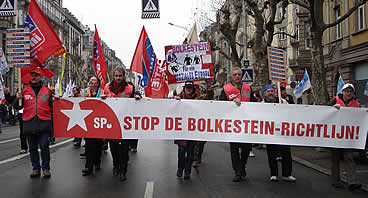What will Brussels do to our social rights in 2010?
What will Brussels do to our social rights in 2010?
On 7th January we return to work in Brussels, but this does not of course mean that in the meantime, though free of meetings, there's nothing at all to do. This afternoon I'm here in Rotterdam at the commemoration of the victims of the Gaza war, which happened just a year ago. In addition there's a backlog of correspondence to be dealt with, and much to read on what will be the important issues in 2010. And in relation to social affairs we expect a great deal, though it isn't yet clear whether this will take the form of a further deterioration of social rights, or if it remains possible that after all something good for the rights of working people and the unemployed might come out of Brussels. A great deal will depend on the question of whether we will be sharp enough to take action when it is necessary to do so.

Protest against the Services Directive
What then is likely to happen in the course of 2010? First of all there will be an outbreak of debate around the internal market. Even in Brussels it is now acknowledged that ordinary people have not gained very much from this. A few weeks ago in Strasbourg I attended a talk by the Italian professor and former European Commissioner Mario Monti, who has been asked by European Commission President Jose Barroso to write a report on the internal market with a view to improving its working and 'win the hearts of the people for the market'. His talk sounded sometimes almost as if it were moved by social considerations. We should have taken the work necessary for the social market economy – a term which occurs in the newly adopted Lisbon Treaty - more seriously, he said. This gave the impression that he wanted to tackle deteriorating conditions of employment, but he remained extremely vague about this. He did talk about things which distort competition, such as differences in tax rates and social security. So we shouldn't be surprised if he eventually comes up with proposals for harmonising of social security and income tax. Imagine that: in the future it won't be our own government in the Netherlands which determines our tax rates and the social security system, but Brussels. For the Netherlands that can only mean further deterioration. We must keep a close eye on developments pertaining to the internal market. Not only to address the draining away of our rights that has occurred in recent years, but primarily to prevent its use as a means to launch a direct attack on our social rights.
That isn't all. In 2010 there will also be debate around the post-Lisbon strategy. The Lisbon Strategy was established with the aim of making Europe's economy the most competitive in the world by 2010. This didn't work out, but new attempts are therefore now to be made. The Lisbon Strategy has already involved beginning a discussion of workers' rights in relation to dismissal, a discussion which will now break out much more fiercely. In place of the certainty that you can keep your job, Brussels wants to give you the certainty that you will never in your life be unemployed. You will, however, have to jump from job to job. Not really something we would in truth look forward to, even if the European trade unions consider it a good idea!
As European Parliamentary representatives of the SP we will of course be keeping a close eye on these developments. But don't be surprised if in 2010 we have to organise protests, in The Hague and in Brussels. I am not at all convinced that our social rights are in good hands with the new Commission.
Despite all this I wish all readers a very good 2010. To close the account we have shown recently that alongside ordinary people we can make a fist of things in Brussels: the Port Service Directive fell after protest marches in Rotterdam and Strasbourg, while the Services Directive was watered down after strong protests. We can do it, then, and if needs be we will show this again in 2010. Don't you think?
- See also:
- Dennis de Jong
